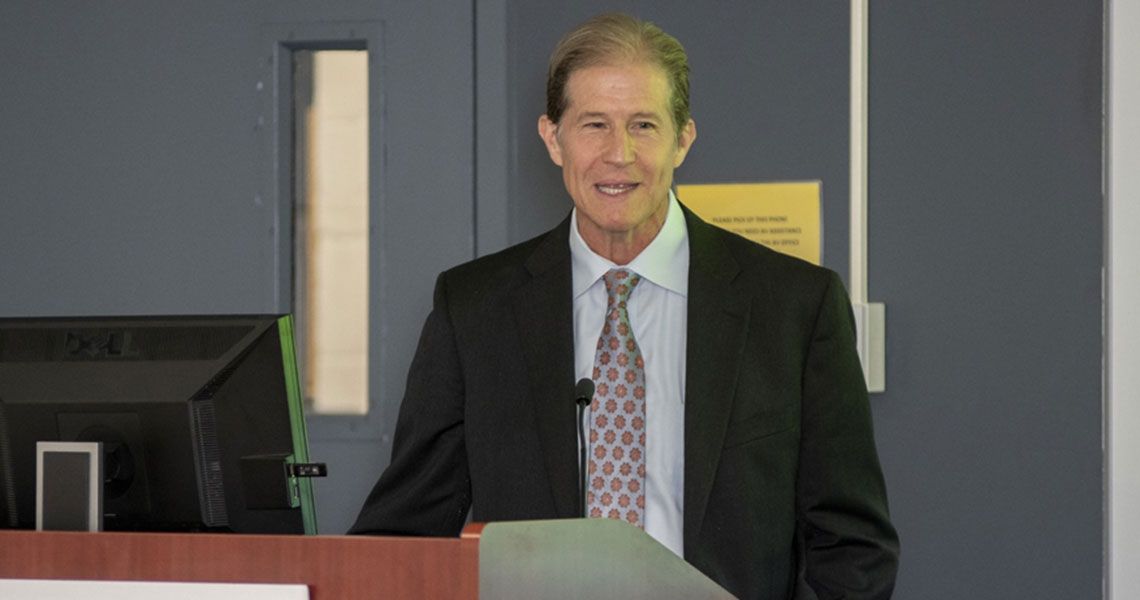His patient, “Sally,” began Wayne Jonas, MD, was an executive vice president, wealthy with platinum-level health insurance. She’d had a car accident, though, and developed persistent lower back pain, which she treated with NSAIDS and physical therapy. Three months later, however, as she reached for her suitcase to head to the airport for a business trip, she felt a pop. She received treatment in the emergency department, and then began taking prescribed opioids.
“She loved that, [because] opioids work for acute pain,” Jonas, executive director of the Samueli Integrative Health Programs and professor in the Department of Family Medicine at Georgetown University, told the audience at the inaugural Patrick and Marguerite Sung Symposium. The event, sponsored by the George Washington University School of Medicine and Health Sciences Office of Integrative Medicine and Health, also featured a panel discussion and question-and-answer session.
“She felt so much better that she kept taking them without fundamentally changing the underlying physiology and psychology in her own body to stay well,” continued Jonas, who served as the symposium’s Theodore and Cynthia Birnbaum Memorial Speaker. He has also served as the founding director of the National Institutes of Health Office of Alternative Medicine, director of the World Health Organization's Center for Traditional Medicine, and director of the Medical Research Fellowship at the Walter Reed Army Institute of Research.
That focus — looking beyond symptoms to the core reasons behind a health issue — is the cornerstone of integrative medicine, which Jonas outlined in his lecture, “How Healing Works and What It Means for Health Care.”
Clinicians, he said, need to rethink their approach to healing. “The fundamental question needs to be, how does— or how can — health care actually get us to health and well-being?”
Take Sally, who was struggling with opioid dependence and depression when Jonas met her. “Eventually, she had to stop working because of the pain and the medications she was on,” he recalled, adding that taking away her job was a blow to his workaholic patient. “The problem is how we manage a chronic disease like lower back pain.”
After talking to Sally, Jonas completed her SOAP, or subjective, objective assessment plan – a convenient method for getting to the inner layers of a patient’s problem for which electronic medical records already provide space. He also outlined Sally’s HOPE note, or healing-oriented practices and environments, through precise questioning.
“If we want to address the underlying determinants and provide whole-person care, we need to ask … what matters,” said Jonas. “We need to have a dialogue within the encounter that is about meaning and purpose. That’s the HOPE note.”
What mattered to Sally, Jonas determined, was managing her medication and a loss of purpose after leaving her job. Jonas set up a health care team, helping her find specialists in chronic pain, involving her family, and convincing her to reframe her thinking about her pain and her body.
“This is what the health care team looked like: a merger of conventional medicine, evidence-based complementary medicine, and self-care,” Jonas said. “This is called integrative health care. … She launched a healing journey using integrative health. Over the next period of three to six months, her pain was consistently down.”
Soon, Jonas said, Sally was planning a return to work.
“If we don’t [use an integrative approach], if we stick with mainstream health care … and say, ‘that’s enough, this is where the science is, this is what we need to do,’ we’re going to continue to have major challenges,” he explained, adding the United States spends more than any other country on medical care. Incorporating integrative health to care is essential for managing both patients’ chronic illnesses and the financial burden on Americans.
What providers can do, he said, is reframe questions and goals to address health determinants, or complete a HOPE note for every patient. They can also include complementary medicine, such as acupuncture, mind-body techniques, and nutrition. Patients, meanwhile, should focus on self-care, determine what matters to them, what brings them joy, whether it’s working, like Sally, or something entirely different.
“I charge you with understanding integrative health is not just a luxury; it actually is at the core of what is needed for chronic disease management,” Jonas said. “We need to get on board with integrative health.”
Jonas’ lecture is available online.
The Office of Integrative Medicine and Health (OIMH) creates a collaborative space for SMHS faculty, researchers, students, and clinician affiliates to focus on educational and scholarly activities within integrative medicine. It engages and supports GW medical and academic faculty in integrative medicine practice. Launched in 2017, the OIMH connects with physicians and the larger community of complementary and alternative medicine practitioners who form the foundation of this practice. It drives coordination among multiple educational programs at GW, including the Integrative Medicine Programs.



